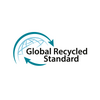
Global Recycled Standard (GRS)
Standard Owners (1)
| Name | Country | |
|---|---|---|
| TEXTILE EXCHANGE | 🇺🇸 United States |
About (Global Recycled Standard (GRS))
The Global Recycled Standard (GRS) is a certification program that sets requirements for products made with recycled materials. It provides a transparent and traceable supply chain for companies and consumers to ensure the authenticity and integrity of recycled content in products.
The GRS is managed by Textile Exchange, a global nonprofit organization focused on promoting sustainability in the textile industry. It is applicable to various sectors, including textiles, apparel, and accessories. The standard sets out requirements for both pre-consumer and post-consumer recycled materials and covers the entire supply chain, from raw material input to the final product.
The key principles of the GRS include:
Material Traceability: The GRS requires a robust tracking system to ensure the traceability of recycled materials throughout the supply chain. This helps to verify the origin and percentage of recycled content in the final product.
Social and Environmental Criteria: The standard includes social and environmental criteria that companies must meet, such as compliance with labor laws, safe working conditions, and environmentally responsible practices. It encourages responsible production and minimizes the negative impacts of manufacturing processes.
Chemical Restrictions: The GRS sets limits on the use of hazardous chemicals in the production of recycled materials. It promotes the use of safer alternatives and ensures that the recycled products meet certain chemical requirements to protect human health and the environment.
Verification and Certification: To obtain GRS certification, companies must undergo independent third-party audits to verify their compliance with the standard's requirements. This helps to maintain the credibility and reliability of the certification.
The GRS enables companies to demonstrate their commitment to sustainability and circular economy principles. It provides assurance to consumers that products with the GRS certification contain a significant amount of recycled content and have been manufactured with environmental and social considerations in mind.
By promoting the use of recycled materials, the GRS contributes to reducing the reliance on virgin resources, minimizing waste generation, and lowering the carbon footprint associated with the production of new products. It supports the transition towards a more circular and sustainable economy by encouraging the recycling and reuse of materials.
Overall, the Global Recycled Standard plays a crucial role in driving the adoption of recycled materials in various industries and providing a reliable framework for companies to showcase their commitment to sustainable practices and responsible sourcing.